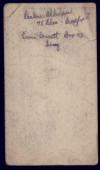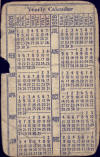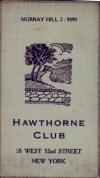
Speakeasy Cards
The speakeasy -- illicit drinking places --
were a result of the Prohibition amendment to the US Constitution. It
seems that the right to get drunk and make a fool out of oneself is ingrained in
the American character, and well-meaning efforts to rid society of the scourge
of demon rum, which finally were manifested in the 18th Amendment, really had
not only the effect of making alcohol abusers out of people who otherwise would
probably not have touched a drop, but also had reduced the regard our populace held
-- and holds -- for the rule of law. (For an interesting view of the
prohibition movement, see our download on the
first 20 years of the WCTU in New York
State!)
Because the nature of the speakeasy was that
it was essentially a public place, yet one that was performing an illegal
activity, some way of conveniently identifying people who were not associated
with law enforcement was needed by the speakeasy industry. Initially, word
of mouth and personal recognition served to identify people who could be
admitted to illicit drinking establishments.
However, as illegal drinking became more and
more widespread, and more and more people wanted to do it, personal recognition
of customers no longer sufficed. Some form of portable identification was
needed, and the speakeasy card was the result.
The cards which appear here are from the
collection of the late Edmond B. Brown, and are c. 1928. Most are from New
York City, where he was employed in the then-booming automobile industry, and
where good customer relations always required taking the customer out for a
drink.
Click on any of the images to see a larger
version of the card.

The 44th Street Club. Not much
question what this place was. |

Whether the typographical error on the card
was intentional (note the misspelling of "Goodmam") is open to question,
but it could have been a technique for spotting counterfeit cards.
Presumably Harry was the proprietor. The card imitates the format
of a social card of the era where the gentleman's club's name would
appear on his cards. |

"Private Restaurant" was clearly a device by
which customers could be screened before admission. Brown's wife
was once heard to refer to this particular establishment as "that blind pig!".
The term "blind pig" referred to a particularly low-class form of
speakeasy without entertainment. |

It appears that this inscription on the back
of the card further verified it as genuine and the holder as authorized
to enter. |

The private club device was often used by a
speakeasy to restrict admission. Dues were nominal.
Interestingly, the name of the holder of this card was not the same as
the name on the card itself. Possibly the holder wished to be more
or less anonymous. Note also that no address is given on this
card, making it more difficult to find if law enforcement happened upon
the card. |

On the reverse of the previous club, we see
just how hard the place was to find -- instructions are written to
facilitate finding the place from the Hotel Ten Eyck in Albany, NY. |

We do not know for sure that the Drury Lane
Inn was a speakeasy! This simply looks like an ordinary business
card for a law-abiding restaurant, which the establishment probably
pretended to be. This is, frankly, guilt by association -- there was no good
reason to keep a legitimate restaurant's business card with one's speakeasy
cards. |

We also do not know who these ladies are.
Brown was not married until 1929, so they could have been young ladies
whom he met at that establishment. |

Again, the LaSalle Restaurant could have
been a legitimate restaurant. However, the color printing would
have made this card more difficult to copy than others, and the
additional typefaces used would further compound the problem in an era
before color copiers. |

The back of the LaSalle Restaurant card -- a
calendar of the year 1928 -- increases the probability that this was a
membership card masquerading as a business card. The artifice of
the calendar permits the person checking cards to ensure that the
membership is current. |

The Richmond Grill may or may not have been
"A Unique Place" but it says it is. |

The back of the Richmond Grill card. |

We know nothing about the Hawthorne Club --
perhaps it was a reading group for the works of Nathaniel Hawthorne, but
we seriously doubt it. |
|
|
|
CLICK HERE
to return to our Americana page
|